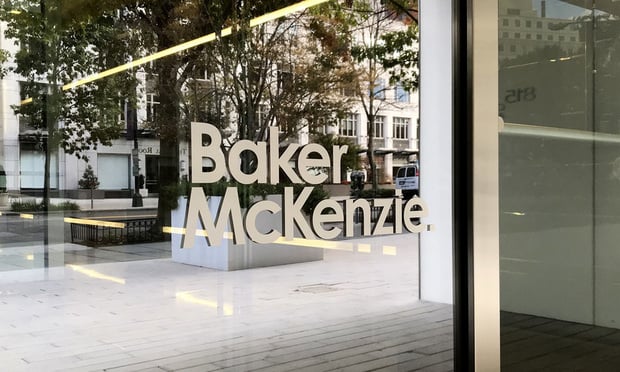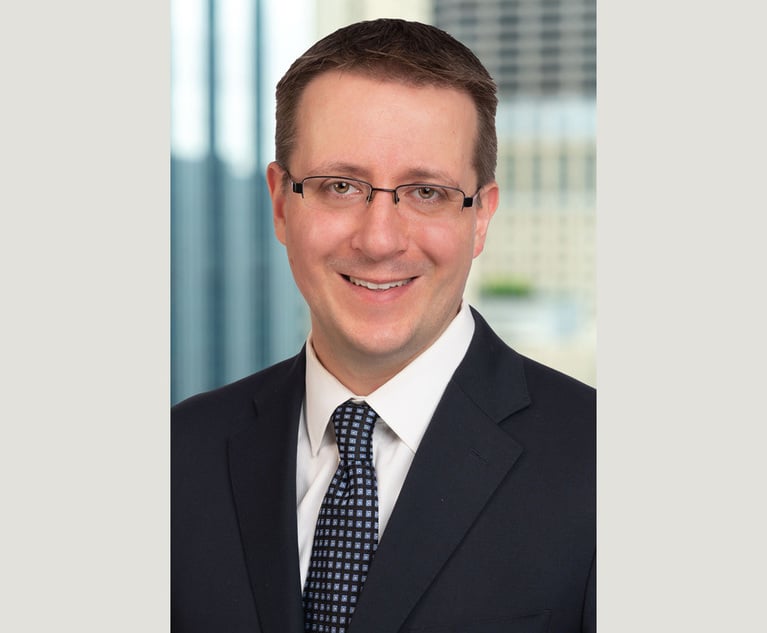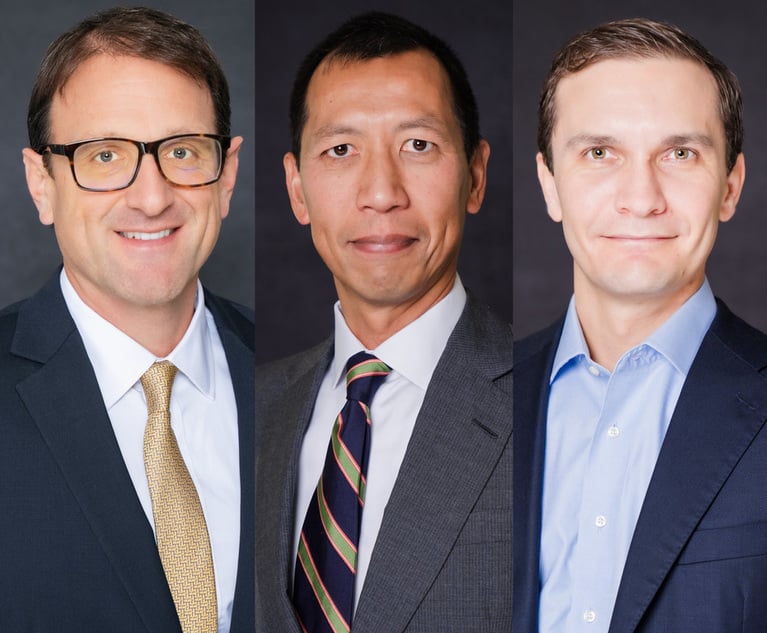Baker McKenzie Hit With Malpractice Suit Over Russian Coal Mine Fight
A former client claims the global firm bungled an effort to recover a Siberian mine valued at $200 million.
December 05, 2018 at 05:38 PM
4 minute read
The original version of this story was published on The American Lawyer
 (Photo: Diego M. Radzinschi/ALM)
(Photo: Diego M. Radzinschi/ALM)
Baker McKenzie faces a hefty malpractice suit over its work on behalf of a Spanish client who used the firm in a failed effort to recover ownership of a Siberian coal mine that client says is valued at over $200 million.
In a suit filed last month in state court in Chicago, where the global law firm was founded, Daniel Rodriguez and his British company Lehram Capital Investments Ltd. allege that attorneys for the firm failed to detail connections in Russia that might have affected their advice on his claims.
They also accuse Baker McKenzie of misleading them into a proposed litigation finance deal with another firm client who had been convicted of a violent crime, a move they say damaged their reputations in the international business community.
The complaint only names one Baker McKenzie attorney, associate Roman Butenko, who is currently attached to the firm's Washington, D.C. office. He is not named as a defendant in the case.
“Rodriguez relied on the marketing of Baker & McKenzie as a one-stop, global firm suited in particular to Rodriguez's international businesses for the past eight years,” Illinois attorney Daniel Konicek of Konicek & Dillon said in the complaint.
According to the complaint, Lehram purchased the Gramoteinskaya coal mine in the Kemerovo region of Siberia in a 2013 deal with London-based Evraz Holdings in which he also took on $70 million in debt.
But shortly afterward, Lehram director Igor Rudyk, the general manager of the mine, was detained by Russian authorities in Kemerovo and ultimately forced to sign documents transferring ownership of the mine to an entity owned by the Shchukin family, which has close ties to the deputy governor and governor of Kemerovo.
That prompted Rodriguez to retain Baker McKenzie in 2016 to help recover the mine. But, according to the complaint, the firm did not reveal to him that it had a number of clients in the Kemerovo region, including the original seller of the mine and others that relied on the “patronage” of the governor of the region.
These connections, Rodriguez says, potentially affected the litigation strategy in the case. For example, while he discovered video of the governor transferring the mine to the Shchukin family days before Rudyk supposedly executed the transfer documents, Baker McKenzie allegedly advised Rodriguez consistently against showing the video in hearings. Rodriguez also accused the firm's lawyers of filing a claim challenging a notary's signature in the wrong court.
Rodriguez said the firm also led him astray when it became clear he needed litigation financing to pursue the matter. It introduced him to another firm client that had faced a similar takeover of its mines from the Shchukin family but had resolved the matter successfully.
But after meeting with a representative of the client and being advised by him and the firm to petition for a criminal investigation against the Shchukins, he was told at a second meeting that he would have to pay the client, Gavril Yushvaev, $300,000 and give him a 50 percent share in the mine to ensure the success of the investigation.
While these negotiations ultimately proved unsuccessful for Rodriguez, he says that his relationship with Yushvaev, who spent nine years in a labor camp after being convicted of a violent crime, ultimately became public in the banking and mining communities.
Rodriguez did not indicate how much he is seeking in damages, and his attorney was in a trial Wednesday and did not immediately respond to a request for comment.
“The claim has no merit and we will contest it vigorously. A U.K.-based company filing a claim in Cook County, Illinois for work carried out in Russia is a blatant example of forum shopping,” Baker McKenzie said in a statement.
The firm is currently litigating an unrelated malpractice action in the Superior Court of the District of Columbia over claims that its affiliate in Brazil jeopardized a client's $3.18 billion settlement from that country's “Operation Car Wash” corruption scandal.
Read More:
Baker McKenzie Downplays Ties to Brazilian Affiliate in 'Operation Car Wash' Case
This content has been archived. It is available through our partners, LexisNexis® and Bloomberg Law.
To view this content, please continue to their sites.
Not a Lexis Subscriber?
Subscribe Now
Not a Bloomberg Law Subscriber?
Subscribe Now
NOT FOR REPRINT
© 2025 ALM Global, LLC, All Rights Reserved. Request academic re-use from www.copyright.com. All other uses, submit a request to [email protected]. For more information visit Asset & Logo Licensing.
You Might Like
View All
An Eye on ‘De-Risking’: Chewing on Hot Topics in Litigation Funding With Jeffery Lula of GLS Capital

Litigators of the Week: A $630M Antitrust Settlement for Automotive Software Vendors—$140M More Than Alleged Overcharges
Trending Stories
- 1Litigator of the Week Runners-Up and Shout-Outs: Davis Wright Tremaine, Wilmer and More
- 2Forum Clause Axes $844M Case Against Reinsurer Over Deadly Plane Crash, Judge Rules
- 3Latham Adds Former Treasury Department Lawyer for Cross-Border Deal Guidance
- 4Understanding the HEMS Standard in Trusts
- 5Mergers Are About People, Not Paperwork: Here’s Why
Who Got The Work
J. Brugh Lower of Gibbons has entered an appearance for industrial equipment supplier Devco Corporation in a pending trademark infringement lawsuit. The suit, accusing the defendant of selling knock-off Graco products, was filed Dec. 18 in New Jersey District Court by Rivkin Radler on behalf of Graco Inc. and Graco Minnesota. The case, assigned to U.S. District Judge Zahid N. Quraishi, is 3:24-cv-11294, Graco Inc. et al v. Devco Corporation.
Who Got The Work
Rebecca Maller-Stein and Kent A. Yalowitz of Arnold & Porter Kaye Scholer have entered their appearances for Hanaco Venture Capital and its executives, Lior Prosor and David Frankel, in a pending securities lawsuit. The action, filed on Dec. 24 in New York Southern District Court by Zell, Aron & Co. on behalf of Goldeneye Advisors, accuses the defendants of negligently and fraudulently managing the plaintiff's $1 million investment. The case, assigned to U.S. District Judge Vernon S. Broderick, is 1:24-cv-09918, Goldeneye Advisors, LLC v. Hanaco Venture Capital, Ltd. et al.
Who Got The Work
Attorneys from A&O Shearman has stepped in as defense counsel for Toronto-Dominion Bank and other defendants in a pending securities class action. The suit, filed Dec. 11 in New York Southern District Court by Bleichmar Fonti & Auld, accuses the defendants of concealing the bank's 'pervasive' deficiencies in regards to its compliance with the Bank Secrecy Act and the quality of its anti-money laundering controls. The case, assigned to U.S. District Judge Arun Subramanian, is 1:24-cv-09445, Gonzalez v. The Toronto-Dominion Bank et al.
Who Got The Work
Crown Castle International, a Pennsylvania company providing shared communications infrastructure, has turned to Luke D. Wolf of Gordon Rees Scully Mansukhani to fend off a pending breach-of-contract lawsuit. The court action, filed Nov. 25 in Michigan Eastern District Court by Hooper Hathaway PC on behalf of The Town Residences LLC, accuses Crown Castle of failing to transfer approximately $30,000 in utility payments from T-Mobile in breach of a roof-top lease and assignment agreement. The case, assigned to U.S. District Judge Susan K. Declercq, is 2:24-cv-13131, The Town Residences LLC v. T-Mobile US, Inc. et al.
Who Got The Work
Wilfred P. Coronato and Daniel M. Schwartz of McCarter & English have stepped in as defense counsel to Electrolux Home Products Inc. in a pending product liability lawsuit. The court action, filed Nov. 26 in New York Eastern District Court by Poulos Lopiccolo PC and Nagel Rice LLP on behalf of David Stern, alleges that the defendant's refrigerators’ drawers and shelving repeatedly break and fall apart within months after purchase. The case, assigned to U.S. District Judge Joan M. Azrack, is 2:24-cv-08204, Stern v. Electrolux Home Products, Inc.
Featured Firms
Law Offices of Gary Martin Hays & Associates, P.C.
(470) 294-1674
Law Offices of Mark E. Salomone
(857) 444-6468
Smith & Hassler
(713) 739-1250








